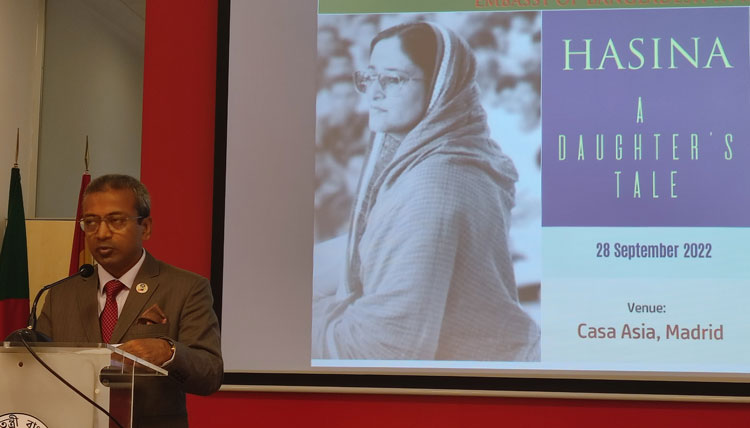The Diplomat
The Ambassador of Bangladesh, Mohammad Sarwar Mahmood, invited last Wednesday 28 September to the screening at Casa Asia in Madrid of the docudrama Hasina, A Daughter’s Tale, about the life of Prime Minister Sheikh Hasina, starring and narrated by herself and her younger sister Sheikh Rehana.
This docudrama, made in 2018, recounts the youth and all the tragic moments in the life of the prime minister, “portrayed, in the words of the Bangladeshi ambassador, as a personality who is the stream of Bangladesh’s history.”
“In the docudrama, Ambassador Mohammad Sarwar Mahmood continued, we see how Prime Minister Sheikh Hasina and her sister Sheikh Rehana survived the assassination attempt on the fateful night of August 15, 1975, when Hasina’s father Bangabandhu Sheikh Mujibur Rahman, along with most of her family members were killed.”
This attack coincided with a trip to Germany, Hasina’s husband’s place of work, and specifically with a visit to Belgium. On that tragic evening, they were attending a dinner at the residence of the former Bangladeshi ambassador to Belgium, Sanaul Hoque. Sanaul Hoque, while listening to the news of the coup in Bangladesh, remarked, “The daughters and family members of the former prime minister are a burden to me now. They should leave their place of residence soon”.
At the time, they were assisted by the former Bangladeshi ambassador to Germany, Humayun Rashid Chowdhury, to return to Germany. “However, the Bangladeshi ambassador pointed out, at that time, another friend of Bangladesh and Bangabandhu, Srimoti Indira Gandhi, the former prime minister of India, helped the surviving family members of the Father of the Nation of Bangladesh. She offered not only political asylum but also material and necessary help to the prime minister and her family members in India.”
“Sheikh Hasina spent 6 years in exile in India before her heroic return to her beloved motherland on May 17, 1981, the ambassador remarked. She was unable to return to the country after the assassination of her father and all her family members as successive governments imposed a ban on her entry into the country. After his return, he started travelling to every corner of Bangladesh to mobilise public support and free the country from the shackles of the military dictatorship. During November and December 1987, a massive uprising occurred in Dhaka and several people were killed, including Noor Hossain, an Awami League activist and supporter of Hasina. She, along with others, continued to work to restore a democratically elected government, which they achieved after a constitutional referendum returned the country to a parliamentary form of government. The ensuing parliamentary general elections were won by the BNP in 1991 and Hasina became leader of the opposition during 1991-1996,” the ambassador commented.
Sheikh Hasina brought her party to power through the June 1996 general elections. Hasina served her first term as prime minister of Bangladesh from 1996 to 2001. In the 2001 general election, Awami League failed to win. During her second term as opposition leader, political unrest and violence increased.
On 16 July 2007, Hasina was arrested by police at her home and was taken to Dhaka for questioning. After 11 months, on 11 June 2008, she was granted parole on medical grounds. Later, her Awami League and “The Grand Alliance” (with a total of 14 parties) won the 2008 general election with a two-thirds majority, winning 230 of the 299 seats. She thus became prime minister for the second time. Since then, she has won three consecutive elections. Sheikh Hasina is the longest-serving prime minister in Bangladesh’s history. During her long political career, she has faced 19 life-and-death attacks with grenades, bombs and guns by factions of the ruling party.
“Under his strong leadership, the ambassador pointed out, Bangladesh consolidated itself as a stable democracy while dramatically improving the quality of life of its citizens. He is also vindicating Bangladesh’s position in the world, speaking out for justice and the urgent need to address climate change. Its invincible leadership in poverty alleviation, health sector, women’s empowerment and environmental protection honoured the country on the global frontier.”
“Distinguished audience, ended Ambassador Mohammad Sarwar Mahmood, I am pleased to share with you, along with all my compatriots, that today is the seventy-sixth birthday of Bangladesh Prime Minister Sheikh Hasina. I think watching this docudrama would be a humble gesture on our part to celebrate her birthday.”







